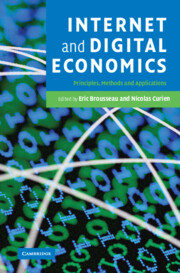Book contents
- Frontmatter
- Contents
- List of figures
- List of tables
- Notes on contributors
- Acknowledgements
- 1 Internet economics, digital economics
- Part I Toward a new economy?
- Part II On-line communities
- 5 Information goods and online communities
- 6 Online consumer communities: escaping the tragedy of the digital commons
- 7 Network cooperation and incentives within online communities
- Part III Network externalities and market microstructures
- Part IV Producing, distributing and sharing information goods
- Part V How e-markets perform
- Part VI Evolving institutional infrastructures
- Part VII The impacts of the Internet at the macro level
- References
- Index
5 - Information goods and online communities
from Part II - On-line communities
Published online by Cambridge University Press: 22 September 2009
- Frontmatter
- Contents
- List of figures
- List of tables
- Notes on contributors
- Acknowledgements
- 1 Internet economics, digital economics
- Part I Toward a new economy?
- Part II On-line communities
- 5 Information goods and online communities
- 6 Online consumer communities: escaping the tragedy of the digital commons
- 7 Network cooperation and incentives within online communities
- Part III Network externalities and market microstructures
- Part IV Producing, distributing and sharing information goods
- Part V How e-markets perform
- Part VI Evolving institutional infrastructures
- Part VII The impacts of the Internet at the macro level
- References
- Index
Summary
Internet mass utilization developed during the years 1995–2000, especially via web and e-mail services. It was believed, perhaps a little too quickly, that information and communication technologies (ICTs) would improve markets' operation. It was wrongly imagined that business and social models of the real world would easily extend into the virtual world. The collapse of the dotcoms showed that the transition was not so easy and that a simple transposition of commerce into e-commerce or of traditional media into a “multimedia” environment was doomed to failure. The Internet deeply transforms market dynamics and industrial organization. It is indeed a new economy which is slowly taking root, but not the one that was dreamt up: not an old economy using the Internet but an online economy.
In the beginning it was thought that groups of surfers in “virtual communities” would follow the pattern of real communities and become the online extension of the latter. It was imagined that, at best, online communities would become almost as efficient as their real counterparts, that they would induce relationships almost as intimate and behavior almost as cooperative. According to the model of monopolistic competition, it was concluded that more extensive and more mobile communities would entail better segmentations of clients and more accurate differentiation of products at both the production and the distribution levels.
- Type
- Chapter
- Information
- Internet and Digital EconomicsPrinciples, Methods and Applications, pp. 173 - 200Publisher: Cambridge University PressPrint publication year: 2007
- 5
- Cited by

